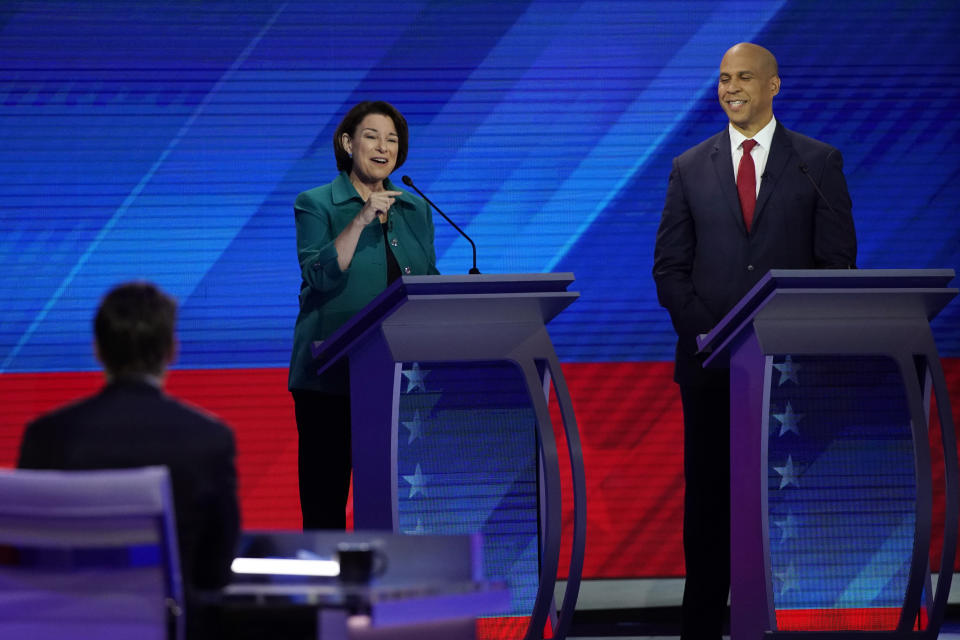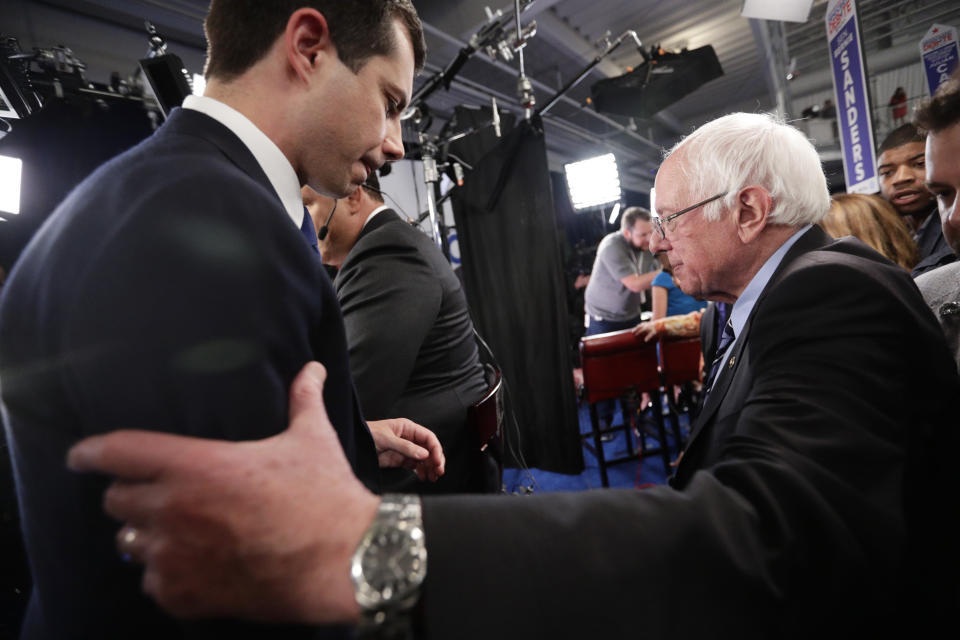Democratic debate: Trump trade war treating workers like 'poker chips' in 'his bankrupt casinos'
The Democratic candidates in Thursday’s presidential debate were quick to criticize President Trump’s trade policies, but stopped short of declaring they would immediately repeal any of Trump’s tariffs.
Andrew Yang was the first to accuse China of engaging in piracy of intellectual property. “A CEO friend of mine was in China recently and he said that he saw pirated U.S. intellectual property on worker workstations to the tune of thousands of dollars per head. Think about all the lost revenue to American companies,” Yang said, adding that “the imbalances are real.”
Yang characterized Trump’s trade strategy as “arbitrary and haphazard,” pointing out that it has produced victims on both sides. But, Yang said, he wouldn’t remove the tariffs right away. “I would not repeal the tariffs on day one, but I would let the Chinese know that we need to hammer out a deal,” he said.
South Bend, Ind., Mayor Pete Buttigieg attacked Trump for not having a strategy for reaching a deal with China. Yet he failed to articulate how his tariff policy would yield a different outcome. “You know, when I first got into this race, I remember President Trump scoffed and said he'd like to see me making a deal with Xi Jinping. I'd like to see him making a deal with Xi Jinping,” he said. “Is it just me, or was that supposed to happen in, like, April?”

Minnesota Sen. Amy Klobuchar blamed Trump for putting Americans in the middle of a trade war and pointed to the cost of Trump’s tariffs to the labor market and soybean farmers who have lost billions of dollars as a result of China’s retaliatory tariffs.
Klobuchar said her policy would entail going back to the negotiating table and possibly cutting back on tariffs. She stopped short of advocating removal of all tariffs. “He is treating our farmers and our workers like poker chips in one of his bankrupt casinos,” she said. “And if we are not careful, he is going to bankrupt this country.”

She also criticized the inconsistency of Trump’s tariff policy which has consisted of threats, delays, and head-spinning escalations. “I wouldn't have had a trade policy where on Aug. 1 he announces he's going to have tariffs on $300 billion of goods, on Aug. 13, he cuts it in half, a week later, he says he's going to reduce taxes, the day after that, he says he's going to do it,” said Klobuchar. “The leaders of the world are watching this, and it undermines our strength as a nation.”
American corporations blamed for trade headaches
Sen. Elizabeth Warren, who has built a reputation for having detailed bold policy proposals for forgiving student debt and universal childcare, for instance, was thin on a plan to address the trade challenges with China. She blamed American corporations for moving manufacturing operations out of the U.S. and into China.
“So our trade policy in America has been broken for decades,” Warren said. “These are giant corporations that, if they can save a nickel by moving a job to a foreign country, they'll do it in a heartbeat. Who has shaped our trade policy? It's been the giant corporations. It's been their lobbyists and their executives.” Earlier this year Warren proposed raising $1 trillion in government revenue from a 7% surtax on profits of the largest corporations.
Warren said that her trade negotiations would not be limited to having Chinese officials at the table. She would like to include stakeholders who will be impacted such as union workers and farmers. “I want to negotiate trade with unions at the table. I want to negotiate it with small farmers at the table,” she said. “I want to negotiate it with environmentalists at the table. I want to negotiate with human rights activists at the table.”
Policy by tweet
Senators Bernie Sanders and Kamala Harris attacked Trump’s penchant for communicating policy: “He conducts trade policy by tweet, frankly born out of his fragile ego,” said Harris. “It has resulted in farmers in Iowa with soybeans rotting in bins, looking at bankruptcy.” Harris said her trade policy “is always going to be about saying, we need to export American products, not American jobs.”

Harris, like some of the other candidates, acknowledged the U.S.’s relationship with China is complicated. “They steal our products, including our intellectual property. They dump substandard products into our economy. They need to be held accountable,” she said.
U.S. can beat China with help from allies
The candidates on stage agreed China is a problem when it comes to intellectual property theft, dumping steel and violating the WTO. Several espoused a tactic that hasn’t really been heard in this White House – working with allies to take on China.
“That's why you need to organize the world to take on China, to stop the corrupt practices that are underway,” Former Vice President Joe Biden said.
Sen. Cory Booker echoed the call for a united front: “We cannot go up against China alone. This is a president that has a better relationship with dictators, like Duterte and Putin, than he does with Merkel and Macron,” Booker said. “We are the strongest nation on the planet Earth, and our strength is multiplied and magnified when we stand with our allies in common cause and common purpose. That's how we beat China.”
More from Sibile:
Trump tariffs cost American businesses $6.8 billion in July
Why a Trump tax cut is no longer a winning campaign strategy
Trump’s stimulus hopes may get frustrated by Congress, 2020 politics
For first time since Trump elected, more voters say economy is worsening
Why more than half of millennials get denied credit
Read the latest financial and business news from Yahoo Finance
Follow Yahoo Finance on Twitter, Facebook, Instagram, Flipboard, LinkedIn, YouTube, and reddit.


